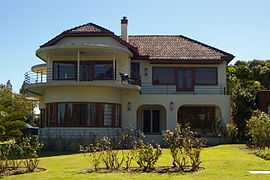Dalkeith, Western Australia
 From Wikipedia - Reading time: 6 min
From Wikipedia - Reading time: 6 min
| Dalkeith Perth, Western Australia | |||||||||||||||
|---|---|---|---|---|---|---|---|---|---|---|---|---|---|---|---|
 Kylemore, on Jutland Parade, built 1938 | |||||||||||||||
 | |||||||||||||||
| Coordinates | 31°59′49″S 115°47′49″E / 31.997°S 115.797°E | ||||||||||||||
| Population | 4,398 (SAL 2021)[1] | ||||||||||||||
| Established | 1897 | ||||||||||||||
| Postcode(s) | 6009 | ||||||||||||||
| Location | 6 km (4 mi) SW of Perth CBD | ||||||||||||||
| LGA(s) | City of Nedlands | ||||||||||||||
| State electorate(s) | Nedlands | ||||||||||||||
| Federal division(s) | Curtin | ||||||||||||||
| |||||||||||||||
Dalkeith is an affluent suburb of Perth, Western Australia within the City of Nedlands. It is also the richest suburb in Perth and Western Australia. This suburb has a median house price of $3,187,500.[2]
History
[edit]The suburb takes its name from a cottage built in 1833 by Captain Adam Armstrong and his sons, early settlers of the area who arrived aboard Gilmore. Armstrong, previously the manager of the Earl of Dalkeith's estate in Scotland, named the house "Dalkeith Cottage".[3] The cottage was on a farm bought by James Gallop, who built a two-storey house c. 1872, now known as Gallop House. In 1897 the farm was sold off in lots for residential use. The house was bought by the state government in 1911, and was neglected for several decades before being restored in 1963-4. It is the oldest extant private residence in Dalkeith and the City of Nedlands.[4][5] The suburb is also surrounded on three sides by the Swan River. As at 2021, Dalkeith was the most expensive suburb for houses in Western Australia, with a median price of $2.9 million.[6] Jutland Parade is the most expensive street in Dalkeith and considered one of the most expensive streets in Perth.[7]
At the riverside lies Sunset Hospital, built in 1904 and closed in 1995. Several of the buildings are heritage listed. In 2005 the University of Western Australia entered into an agreement with the state government to redevelop the site, including a museum, aged care and residential apartments.[8] In September 2007 UWA withdrew from the agreement, citing delays and restrictions caused by the heritage status of the site.[9][10]
Secession
[edit]In early 2009, residents of Dalkeith formed a movement to secede from the City of Nedlands and form their own local government area, ostensibly the Shire of Dalkeith. The residents suggested secession as economically viable - the Shire of Peppermint Grove, the smallest local government area in Australia, was established in 1895 and currently has about 1,600 residents, whereas Dalkeith currently has over 4,000.[11]
References
[edit]- ^ Australian Bureau of Statistics (28 June 2022). "Dalkeith (suburb and locality)". Australian Census 2021 QuickStats. Retrieved 28 June 2022.
- ^ "Perth's Wealth Haven: Its Richest Suburb And Its People". www.avenueperth.com. November 2016.
- ^ "History of metropolitan suburb names – D". Western Australian Land Information Authority. Archived from the original on 16 March 2022. Retrieved 15 May 2007.
- ^ "Gallop House". inHerit. Perth, WA: State Heritage Office. 13 April 2018. Retrieved 27 August 2021.
- ^ Gallop House profile accessed 1 October 2007.
- ^ "How the other half live: Perth's 10 most expensive suburbs". PerthNow. 16 September 2021. Retrieved 6 October 2021.
- ^ "Perth's priciest homes sold in 2016". perthnow.com.au. 21 December 2016.
- ^ New community use for Sunset Hospital site Archived 1 September 2007 at the Wayback Machine 18 May 2005. Department of Housing and Works, accessed 1 October 2007
- ^ Sun sets on UWA deal Archived 15 October 2009 at the Wayback Machine 2007-09-15, The Post. Accessed 1 October 2007
- ^ UWA writes off Sunset cultural plan[permanent dead link] Elizabeth Gosch, 19 September 2007. The Australian, accessed 1 October 2007
- ^ "Dalkeith move to break away from Nedlands". The West Australian. Perth, WA. 12 August 2009. Retrieved 27 August 2021.
 KSF
KSF